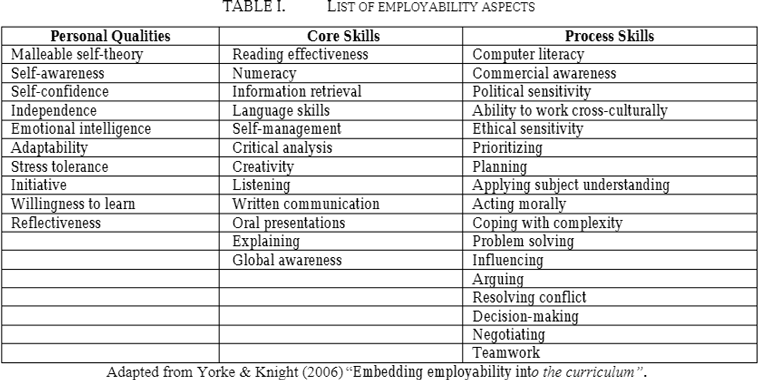Every job role requires a certain specific set of skills and knowledge to be carried out effectively. However, in addition, employees will perform the role more effectively if they have employability skills. These are applicable regardless of the sector or level of the role.
“Employability skills refer to a set of generic skills and personal attributes used in tandem with the application of technical knowledge skills in the workplace. Most importantly these skills are not job specific but are skills whch cut horizontally across all industries and vertically across all jobs at all levels.”
Employability skills are desirable attributes that can be evalued by employers over subject knowledge. Subject knowledge can be taught – but employability skills are developed over time, through a process of continuous learning.
Many – particularly graduates – do not have a good understanding of what these skills are. The QS Global Employer Survey 2018 found that there was a stark contrast in the expected soft skills an employer sought, compared to how a graduate viewed the requirements.
The Learning Skills Framework identifies the following as desirable employability skills:

Source: Employability Skills Required by the 21st Century Workplace (as above)
Research by the Education Research Institutes Network (ERI-Net) concluded that there are five broad domains of employability skills, competencies, values and/or attributes. These are as follows:

Source: Employability Skills Required by the 21st Century Workplace (as above)
The exact skills preferred by a particular employer will, of course, vary from one role to the next.
How can I demonstrate employability skills?
Typically, a candidate will prove their interest to an employer through their work history and past achievements. However, as a graduate fresh out of education and ready to hit the job market, one of your biggest concerns is likely to be your lack of experience.
Unless you’re targeting graduate roles, you’ll find most job adverts mention work experience and you may feel like this is narrowing your choices. Thankfully there are a number of steps you can take to significantly improve your chances of securing an interview when you’re in this position:
1. Acquire some ‘experience’
Firstly, it makes sense to acquire some actual work-type experience – since an employer will be very reluctant to hire someone who has never set foot in the workplace.
Although relevant industry experience will always be the best type to have, other types of experience – where you gain employability skills that are transferable to the workplace – will still be of interest. Consider carefully what skills a particular role will bring, and how you will present these to future employers, before taking on such work.
Employment doesn’t have to be full time or even paid, however: try temping, volunteering (check out Do It for opportunities), freelancing (through sites such as Fiverr or People Per Hour), getting involved with community projects, completing an internship or enrolling on a sandwich course where you spend a day or two at college and the rest with an employer.
Community projects, whilst not work as such, offer experience of critical thinking, problem-solving, teamwork, leadership, communication and project management – employability skills that employers are crying out for in the workplace. However, employers may not appreciate this unless you spell it out to them – and the best way to do this is by showing rather than telling.
2. Show, don’t tell
The contents of your CV will carry far more weight if you SHOW rather than tell. For example, rather than write ‘I’m a good leader’ or ‘I work well in a team’ and other such fluffy sentences, you might write:
“During last summer, I led a 5-person team that set up and ran a soup kitchen 3 nights a week in Nottingham centre. We secured the backing of 7 local stores and served on average 100 service users each night. The project was acclaimed by the Nottingham Post and local groups, Framework, Emmanuel House and Help Out Nottingham.”
The above shows the employer that you possess a whole range of transferable skills, from innovation, persuasion and organisation through to the ability to motivate, lead and work in a team.
3. Establish an industry presence
The next way you can really boost your employability is to establish an industry presence. This can help you demonstrate a whole host of employability skills: reflective thinking (commenting on industry developments), communication skills, collaboration, socialibility, integrity, awareness, tolerance, ethical understanding and many more.
In addition, establishing an industry presence gets your name known to those working in the industry; andit allows you to show prospective employers that you care about the industry, that you’re involved with it and that you’re helping to shape its future.
There are a number of steps you can take to achieve this:
- Create a blog to post articles about relevant industry topics (try WordPress.com for the easiest set up ever).
- Include the URL on your CV with a one-line explanation of what it is.
- Connect with other industry leaders:
- Follow them online, share their material, interact in conversations e.g. on Twitter
- Attend their talks/conferences and review these on your blog.
- Optimise your own profiles on Twitter (here’s how) and LinkedIn (here’s how) to showcase your experience and skills. Tweet and post regularly about industry issues. Include links to your profiles on your CV.
- Interact with industry websites – share their material, join in conversations in the comments sections. Write about interesting discussions on your blog (you can review other people’s articles and give your own reasoned opinion on them, for example).
- Join professional organisations that represent your industry, and attend their regional events. Note down the fact that you’re a member on your CV.
4. Identify and effectively present relevant skills
Another aspect of employability is presenting the skills you have acquired in a way that the employer can translate to the workplace. Presenting your skills favourably to prospective employers will maximise your prospects of success.
Graduates have a lot of skills that those who didn’t take academic qualifications typically won’t have. For example, as students they will have honed their skills of researching, evaluating, presenting and explaining material; and they will have learned to work independently with self-discipline. Such skills have huge value in a whole range of careers, including law and business and media journalism.
One way to successfully communicate these skills is to create an online portfolio of projects you have been involved with, as an extension to your CV. These might have been acquired through part time work whilst studying, during placements, during volunteering, in the community, or during education.
Choosing an appropriate CV layout is crucial – ideally, this needs to be one where the skills section is given prominence, perhaps under the Personal Statement. CV Template Master has a host of CV templates with suitable layouts and best of all they’re free. Don’t be put off by the names of the templates – these are only indicators of the example content they contain. The key point about each of these templates is that they feature generous skills sections early on in the template.
In conclusion…
Whilst every employer will have a particular set of skills and attributes in mind, evident from their job advertisements, employers also want employees who possess transferable employability skills. These are not job specific but instead, come from a range of experiences and learning that begins way before you enter the workplace.
By immersing yourself in your target industry and learning to present the skills you’ve acquired in the very best light, you’ll significantly improve your employability and take a step towards your ultimate dream job.
Frequently asked questions
What is the meaning of employability?
Employability means the attributes that a person has which makes them suitable for paid employment. If someone is employable, they are able to gain, and to maintain employment.
What are employability skills?
Employability skills are the general transferable skills necessary for success in employment, regardless of the sector or level of the role. They can be distinguished from subject knowledge and the technical hard skills required to perform the job.
Originally published February 21st 2019.

It has never been more important to show rather than tell. I am so sick of reading piles of Cvs where the candidate identifies themselves as ‘a team player’ ‘a good communicator’ ‘well presented’ and so on. Honestly, do you really think nobody else said this, and I’ll therefore pick you?